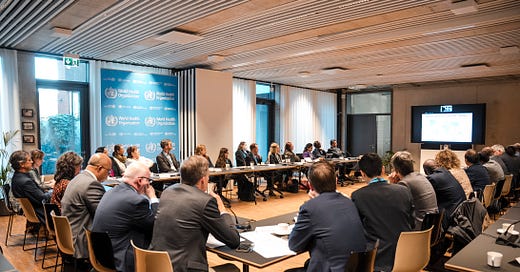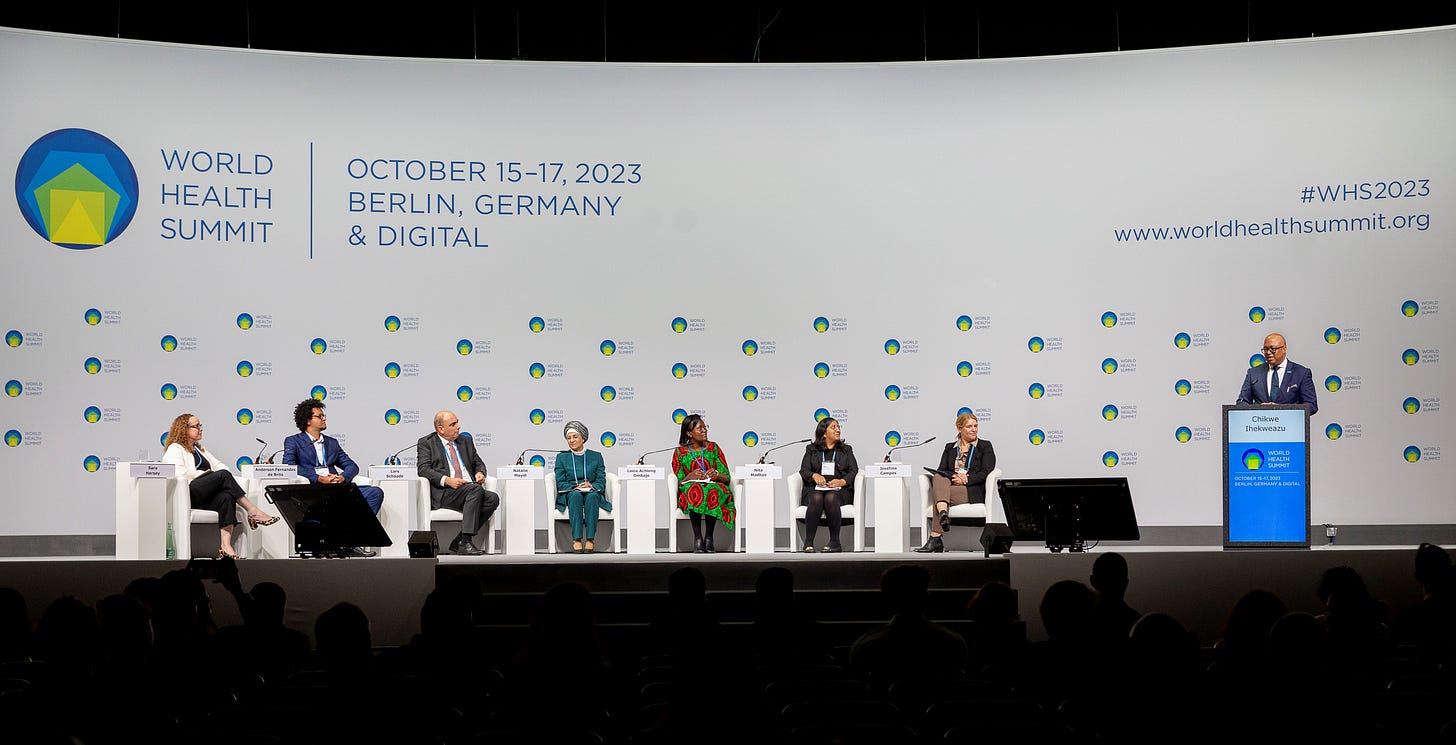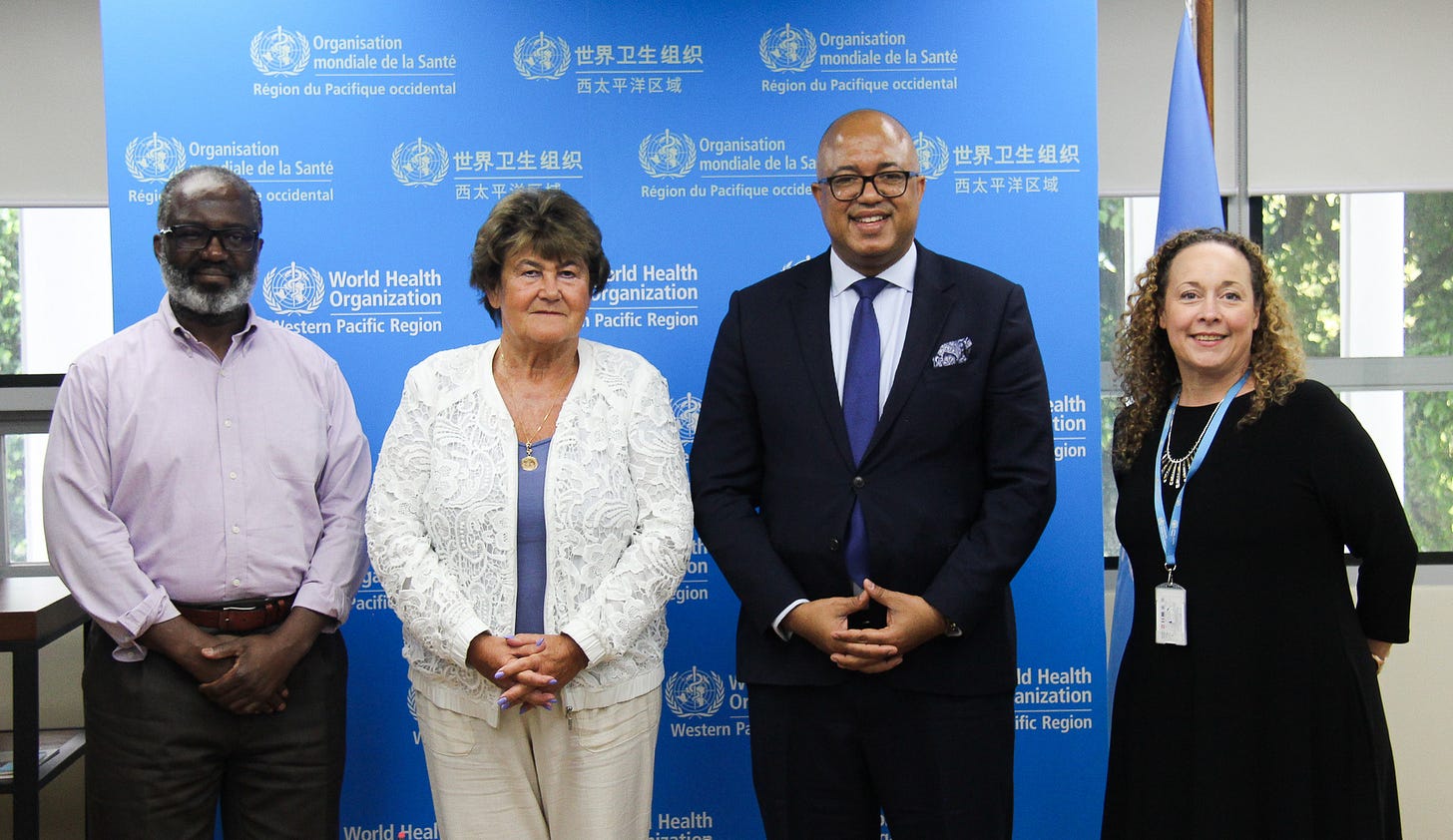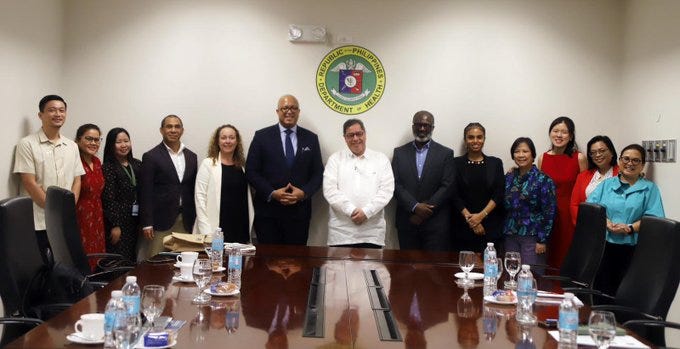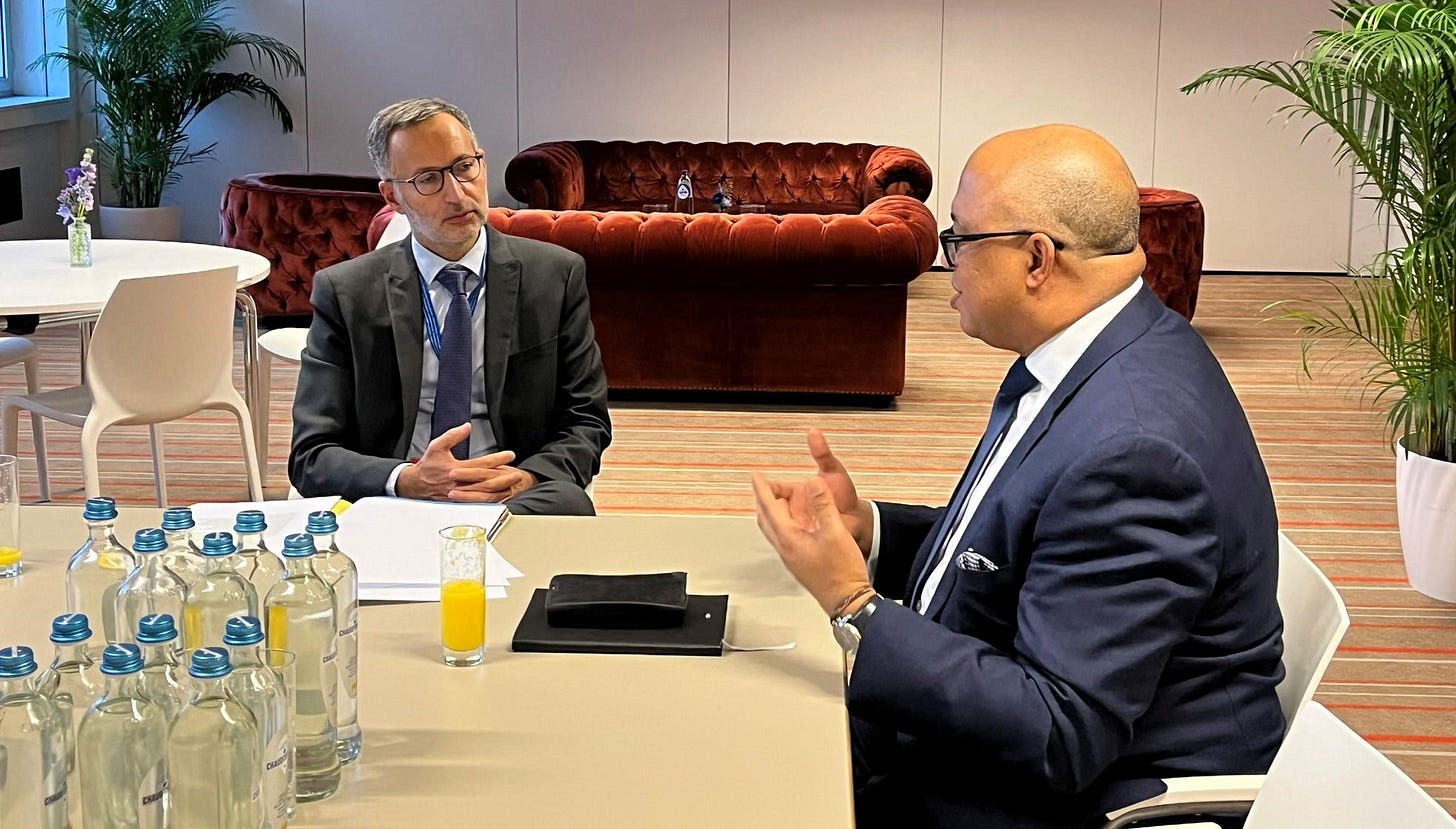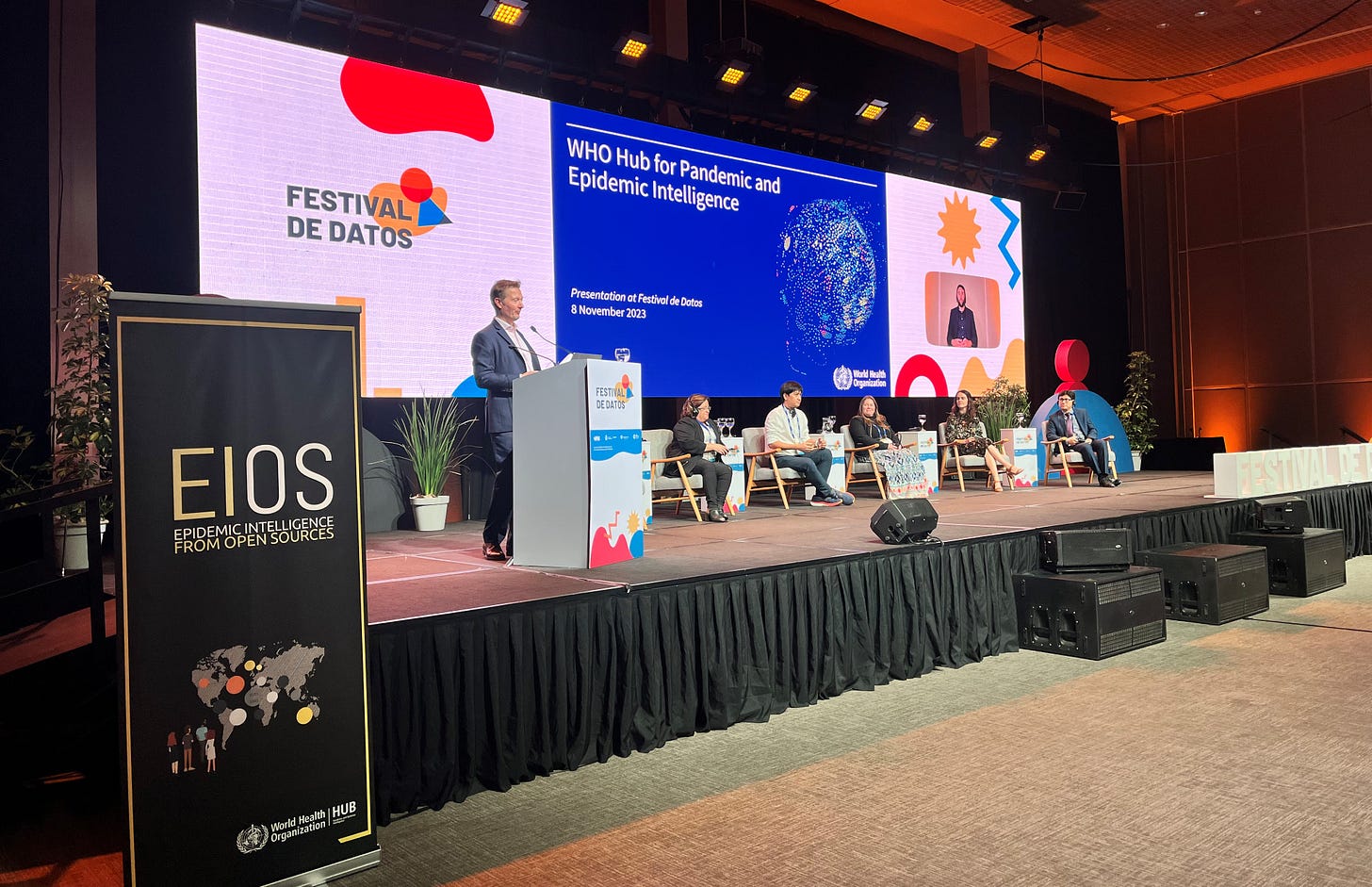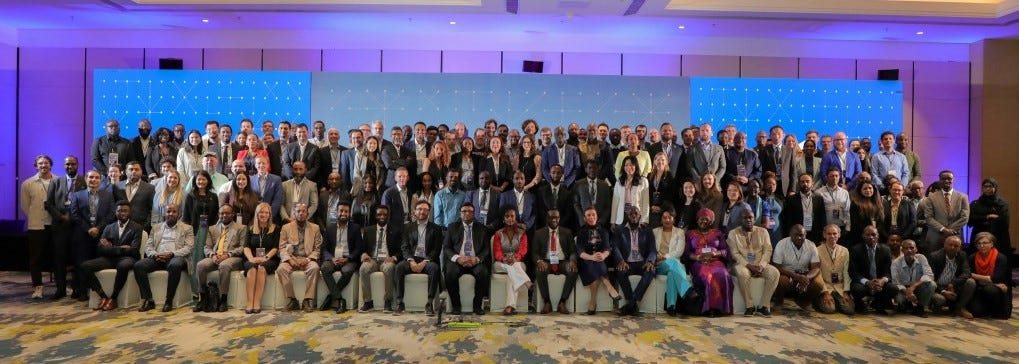The last quarter of 2023 marked three months of accelerated delivery and strengthened collaboration at the WHO Hub for Pandemic and Epidemic Intelligence.
Together with the broader WHO teams and our partners across the world, we have been advancing the implementation of Collaborative Surveillance across all levels as we serve countries and communities to connect, innovate and strengthen capabilities for better data, analytics and decisions.
The following are some of the key highlights. Please read on for more details!
Launch of the Global Field Epidemiology Partnership (GFEP) to strengthen and advocate for the field epidemiology workforce
Visit from Professor Hongbing Shen, Director-General of the Chinese Center for Disease Control and Prevention (China CDC)
First convening of 200 global partners of the International Pathogen Surveillance Network (IPSN)
Co-leading global efforts toward the utilisation of wastewater surveillance
Strengthening public health intelligence during the World Health Summit 2023
Webinar on strengthening health emergency preparedness and response through National Public Health Agencies (NPHAs)
Visit of Assistant Director-General Ihekweazu to the Western Pacific Regional Office (WPRO) and Department of Health of the Republic of the Philippines
International Conference on Public Health in Africa (CPHIA) 2023: Plenary discussion on advancing Collaborative Surveillance through strengthened National Public Health Agencies
HERA 2023 Conference: Strengthening epidemic intelligence for better health preparedness in the EU
Advancing collaboration with the Pan American Health Organization (PAHO)
Speaker Series N°6: Confronting climate-sensitive infectious diseases
Advancing Open Source collaboration for stronger digital public infrastructure
8th Innovation Forum: Highlighting data standards and interoperability for public health surveillance
GLOBAL ENGAGEMENT AND PRIORITY SETTING
Launch of the Global Field Epidemiology Partnership (GFEP) to strengthen and advocate for the field epidemiology workforce
On 18 October, 2023, over 30 global health partners, representing organisations and institutions around the world, launched the Global Field Epidemiology Partnership (GFEP). Its aim is to drive alignment and catalyse efforts to strengthen the field epidemiology workforce and supporting institutions. The meeting was co-chaired by Dr Chikwe Ihekweazu, Assistant Director-General of WHO’s Division of Health Emergency Intelligence and Surveillance Systems, and Dr Kayla Laserson, Director of the U.S. Centers for Disease Control and Prevention’s (CDC) Global Health Center.
The GFEP includes Field Epidemiology Training Programs (FETPs), multilateral, bilateral and nongovernmental organisations, academic institutions, regional and alumni networks, and national public health agencies. This strong interest across countries and partners underscores the vital role of field epidemiology training in pandemic preparedness and response, tackling public health challenges, and strengthening public health systems.
One of the first deliverables of GFEP will be mapping all partners’ activities relevant to field epidemiology to coordinate activities, identify gaps and align on overlaps. Additionally, GFEP will focus on two key areas: 1) scaling up the quantity and improving the quality of field epidemiology workforce development programmes, and 2) supporting activities aimed at strengthening national health system components directly related to field epidemiology, such as surveillance, health information, laboratory, and primary healthcare.
© Marcio Schimming
First convening of 200 global partners of the International Pathogen Surveillance Network (IPSN)
On 13 October 2023, the International Pathogen Surveillance Network (IPSN), convened its first Global Partners Forum in Berlin. The Forum brought together 200 IPSN partners, including Ministries, public health institutions, academia, policy and financial institutions. The goal was to introduce innovations and gain insights from this diverse collaborative group of pathogen genomic surveillance actors and galvanise support for political and financial commitments.
The core of IPSN’s work involves creating communities of practice to collaboratively solve common challenges in pathogen genomics. Specifically, the Forum facilitated dedicated discussions around two communities of practices: one on Pathogen Genomic Data to harmonise data standards and protocols, and one on Environmental and Vector Surveillance, including wastewater surveillance. Technical working sessions were also conducted to build up country capacities, develop investment cases for equitable access to genomic surveillance, and establish interdisciplinary workforce training to break down disciplinary and geographic silos.
Strengthening Public Health Intelligence during the World Health Summit (WHS) 2023
The World Health Summit (WHS) 2023 once again highlighted Berlin’s role as a global convening centre for public health, as part of Germany’s commitment to multilateralism and global health. Located in Berlin, the WHO Hub has embedded itself into the public health ecosystem of the city and Germany while bringing the global convening power and breadth of the WHO.
During the week of WHS, the WHO Hub convened Protecting the World: Moving Rapidly and Together, the plenary discussion explored the role of advanced capabilities (such as data, innovation, and artificial intelligence) in equipping decision-makers with timely and robust intelligence during public health emergencies. To build a robust global health emergency response, greater focus on earlier identification of potential risks and threats to close the ‘first mile of biosecurity’ is needed, spurred by systematic changes and stronger collaboration across sectors, disciplines, and borders.
© Marcio Schimming
The WHO Hub also hosted a group of public health leaders from Ministries of Health and National Public Health Agencies (NPHAs), including Argentina, Canada, South Africa, Côte d’Ivoire, Brazil and Namibia, to explore how WHO can work alongside Member States, NPHAs and public health surveillance actors to collaboratively build strong, resilient and inclusive national public health systems.
© Marcio Schimming
Webinar on strengthening health emergency preparedness and response through National Public Health Agencies
On 20 November, WHO Hub for Pandemic and Epidemic Intelligence convened a webinar on Strengthening Health Emergency Preparedness and Response through National Public Health Agencies (NPHAs), as part of WHO’s work on health emergency prevention, preparedness, response, and resilience (HEPR).
The webinar was a follow-up to an in-person WHO-led NPHA consultation workshop in March 2023, where NPHAs requested networking and learning opportunities to support their preparedness and response efforts. Country experiences from Singapore, Namibia, and Jordan were featured during the webinar, and over 250 representatives of NHPAs from 60 countries joined the discussion. The International Association of National Public Health Institutes (IANPHI) provided opening remarks.
Critical governance issues that affect the ability of NPHAs to deliver on emergency preparedness and response were discussed in the webinar. Throughout the webinar, there was a clear ask from NPHAs for continued and regular networking opportunities as well as support in developing and strengthening their capabilities to deliver essential preparedness and response functions for public health emergencies. Moving forward, WHO will continue these webinars, explore additional networking opportunities for NPHAs, and work closely with NPHAs to define core emergency preparedness and response functions as we support countries to build strong national public health systems.
COUNTRY AND REGIONAL PERSPECTIVES
Visit from Professor Hongbing Shen, Director-General of the Chinese Center for Disease Control and Prevention (China CDC)
As the WHO Hub advances its work on Collaborative Surveillance at the country level, it hosted a delegation from the Chinese Center for Disease Control and Prevention (China CDC) led by its Director-General Hongbing Shen on 07 November.
Dr Chikwe Ihekweazu, WHO Assistant Director-General for the Division of Health Emergency Intelligence and Surveillance Systems, and the team shared the Hub’s efforts to re-imagine and co-create epidemic intelligence through Collaborative Surveillance and explored areas of shared strategic priorities with the China CDC to further enhance technical collaboration, knowledge exchange, and capacity development.
© WHO/Heraa Hajelsafi
Visit of Assistant Director-General Ihekweazu to the Western Pacific Regional Office (WPRO) and Department of Health of the Republic of the Philippines
During the week of 13 November, Dr Chikwe Ihekweazu led a delegation from the WHO Hub for Pandemic and Epidemic Intelligence to visit the WHO Western Pacific Regional Office (WPRO) in Manila.
Through meetings with Dr Zsuzsanna Jakab, WPRO Acting Regional Director, Dr Babatunde Olowokure, Regional Emergency Director, and the broader team, the Hub aligned with WPRO on potential areas to strengthen collaboration, with a focus on how the Hub can support Member States in the region to further contextualise and advance the implementation of Collaborative Surveillance at the country and regional levels.
© WHO/Don Rivada
Dr Chikwe Ihekweazu also had a bilateral meeting with Dr Teodoro Herbosa, Secretary of Health, Department of Health of the Republic of the Philippines to discuss Philippines’ establishment and scaling of its national public health capacities during the pandemic, and how WHO can best support the country to further strengthen its health security capacities.
© WHO
HERA 2023 Conference: Strengthening epidemic intelligence for better health preparedness in the EU
On 05 December, Dr Chikwe Ihekweazu, Assistant Director-General of WHO’s Division of Health Emergency Intelligence and Surveillance Systems, attended the HERA 2023 Conference: Steering reflections for enhanced health preparedness organised by the European Commission Health Emergency Preparedness and Response Authority (HERA) in Brussels. The conference marked the 2-year anniversary of HERA and explored the current state of health preparedness in the EU with a focus on cross-border health threats.
Dr Ihekweazu joined Dr Andrea Ammon, Director of the European Centre for Disease Prevention and Control (ECDC); Prof Christian Drosten, Director of the Institute of Virology at Charité Berlin; and Prof Marion Koopmans, Professor of Public Health Virology, Director of the WHO collaborating centre for emerging infectious diseases at the Erasmus Medical Centre. Together, they discussed the need to strengthen collaboration, better define functionality and build trust to translate epidemic intelligence into better decision-making.
© WHO/Heraa Hajelsafi
Dr Ihekweazu also had a bilateral meeting with Laurent Muschel, Acting Director- General of HERA, to explore ways to further enhance health emergency preparedness and response capacities of Member States in the region and beyond.
© WHO/Heraa Hajelsafi
Advancing collaboration with the Pan American Health Organization (PAHO)
The WHO Hub for Pandemic and Epidemic Intelligence has been strengthening its collaboration with regional offices as we advance the implementation of Collaborative Intelligence at the regional level. One of these is the Pan American Health Organization (PAHO).
On 11 December, Dr Oliver Morgan, Director of Pandemic and Epidemic Intelligence Systems at the Hub, attended the PAHO Regional Meeting on Epidemic Intelligence in Brazil to exchange experiences, align priorities, and map out strategies with regional stakeholders for stronger public health intelligence to protect countries and communities.
© WHO/Raquel Medialdea Carrera
Dr Morgan also led a delegation to visit Uruguay. A bilateral meeting was held with Dr Karina Rando, Uruguay’s Minister of Health and her dedicated team, to discuss how the Hub can support the country further bolster its pandemic and epidemic intelligence capabilities.
© WHO
The Hub delegation also attended the 2nd edition of the Festival de Datos, organised by the Global Partnership for Sustainable Development Data. The team facilitated a session titled Transformative innovations for public health surveillance and intelligence, bringing together the Ministry of Health Uruguay, Opendream, Ginkgo Bioworks, Stellenbosch University, and Vital Strategies. The session featured innovative work by these cross-sector stakeholders, and explored how Collaborative Surveillance can help improve the detection of future public health threats on the continent and beyond.
© WHO/Raquel Medialdea Carrera
COLLABORATIVE SURVEILLANCE IN ACTION
Co-leading global efforts toward the utilisation of wastewater surveillance
From 15-17 November, WHO Health Emergency Intelligence and Surveillance Systems Division (WSE) joined the International Conference Towards a Global Wastewater Surveillance System for Public Health in Frankfurt, Germany. Hosted by the European Commission Health Emergency Preparedness and Response Authority (HERA) and Joint Research Center (JRC) with other partners, the conference brought together representatives from 45 countries and over 175 organisations to connect, share research and activities related to environmental and wastewater surveillance (EWS), and shape the future of a global consortium for EWS.
EWS is anticipated to provide an increasingly valuable data source, complementing other forms of public health surveillance to possibly provide early warning of epidemics and understanding of the global spread of pathogens. A global consortium on EWS is being formed to help identify potential risks and provide valuable data to inform decision-making, and to enable prompt and targeted evidence-based actions. WHO will co-lead this global consortium and will lead the analysis of available EWS data guidelines and standards to address gaps in EWS data exchange and transparency.
International Conference on Public Health in Africa (CPHIA) 2023: Plenary discussion on advancing Collaborative Surveillance through strengthened National Public Health Agencies (NPHAs)
The WHO Hub participated in the 3rd International Conference on Public Health in Africa (CPHIA 2023) held in Lusaka, Zambia. Dr Ihekweazu, and Sara Hersey, Director of Collaborative Intelligence at the WHO Hub for Pandemic and Epidemic Intelligence, moderated the session on Leveraging Networks of Public Health Assets to Promote Science, Innovation and Development; and attended several high-level sessions, including Strengthening Early Warning and Disease Detection:Health Security Partnership in Africa (HSPA).
© WHO / Geoffrey Namara
Throughout the conference, WHO Hub reinforced the critical role National Public Health Agencies (NPHAs) play in strengthening country-level health emergency preparedness and response, highlighted the importance of enhancing epidemic intelligence through technological advancement and innovation for earlier detection, and underscored the need for domestic financing as a catalyst for sustainable funding during health emergencies. The WHO Hub will continue its support for Member States in these areas under the broader context of Collaborative Surveillance.
© WHO / Geoffrey Namara
Speaker Series N°6: Confronting climate-sensitive infectious diseases
On 06 December, leveraging the momentum of COP28, the WHO Hub for Pandemic and Epidemic Intelligence hosted its sixth Speaker Series session exploring the intricate interplay of climate change and infectious disease threats. The session was co-hosted with the Charité Center for Global Health.
Advocating for a health-centred approach to climate change, the session brought together a diverse set of speakers with extensive experience in confronting climate-sensitive infectious diseases across the world. The session highlighted the need for a stronger and more harmonised digital infrastructure to better track, analyse and develop early warning systems for infectious diseases; the urgency for a more participatory, community-driven, transdisciplinary process as we translate policies into climate and health actions locally; and the importance of co-creating innovative and pragmatic solutions together with countries.
© Marcio Schimming
Advancing Open Source collaboration for stronger digital public infrastructure
Since its launch in June 2023, the Open Source Programme Office (OSPO) at the WHO Division of Health Emergency Intelligence and Surveillance Systems has advocated for the Open Source model of collaboration for better public health intelligence with a diverse set of partners globally.
The WHO OSPO team attended the Digital Public Goods Alliance (DPGA) annual members’ meeting that was co-hosted by the Government of Ethiopia. The DPGA is a multi-stakeholder UN-endorsed initiative that facilitates the discovery and deployment of Open Source technologies. WHO OSPO team engaged country representatives from Dominican Republic, Ethiopia, India, Malawi, Norway, Rwanda, Sierra Leone, Singapore, and Togo, as well as international agencies such as FAO, UNDP, UNICEF, WFP, The World Bank to exchange knowledge and explore Open Source collaboration for a stronger digital infrastructure for public health.
Samuel Mubthia, Lead of the WHO OSPO, delivered a keynote address at the launch of the European Organization for Nuclear Research (CERN) OSPO in Geneva on 28 November. The WHO OSPO team provided insights and guidance to CERN as they were establishing their OSPO and hopes to continue to set an example and support other organisations on how to benefit from the Open Source model of collaboration.
© DPGA
8th Innovation Forum: Highlighting data standards and interoperability for public health surveillance
The WHO Hub for Pandemic and Epidemic Intelligence and the WHO Department of Surveillance Systems co-hosted the 8th session of the Innovation Forum on 25 October 2023. With over 80 participants from different organisations, the Forum highlighted the importance of data standardisation and interoperability to enable timely communication, exchange and use of information for public health. Key highlights of the Forum include:
The Berlin Institute of Health (BIH) shared the German Medical Informatics Initiative, an alliance between university hospitals, research institutions, industry, health insurers and patient advocacy groups that harnesses research findings to benefit patients.
Digital Square showcased its efforts to match the needs of countries for digital health systems and the existing solutions that can be reused and leveraged.
The African Population and Health Research Center (APHRC) introduced the regional Implementation Network for Sharing Population Information from Research Entities (INSPIRE) for demographic and health surveillance, as well as the Platform for Evaluation and Analysis of COVID-19 Harmonized data (PEACH), an integrated data hub developed during COVID-19 to support decision-making and research capacity in Kenya, Malawi and Uganda.

